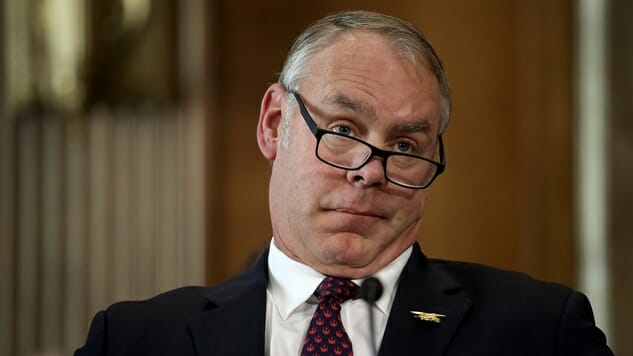Introducing Endless Mode: A New Games & Anime Site from Paste
Secretary of the Interior Ryan Zinke’s statements to Congress last month denying that his department is censoring scientific information have been called into question by a recent report by Reveal. The report appears to show evidence that the National Park Service’s has deleted of all mentions of humans’ role in causing climate change from a scientific report.
The report, which is yet to be released, details sea level rise and storm surge while projecting flood risks posed to coastal national parks. The report was originally drafted in summer 2016 under the Obama administration and has gone through at least 18 different revisions. During those revisions, words such as “anthropogenic” and “human activities” that refer to mankind’s impact on nature were removed.
This is the most recent instance of the Trump administration’s concentrated effort to debunk and devalue the global argument that the burning of fossil fuels is warming the planet, following the president’s appraisal of “clean coal”, weakening of EPA protections and decision to exit the Paris Climate Agreement.
Those within the science community also recognize this effort as political interference and are upset.
“To remove a very critical part of scientific understanding is nothing short of political censorship and has no place in science … censorship of this kind is something you’d see in Russia or some totalitarian regime. It had no place in America,” said Jonathan Overpeck, dean of University of Michigan’s School of Environment and Sustainability.
Others identified the deletions as a violation of a National Park Service policy that protects science from political influence.
“It looks like a pretty clear-cut, blatant violation of what we generally would consider to be scientific integrity,” said former head of the National Ocean and Atmospheric Association Jane Lubchenco.
No one at the Interior Department was available for comment, according to Zinke’s press secretary. Zinke was criticized during his testimony to Congress last month for removing a line referencing climate change and its effect on rising sea levels from a press release, but claimed he didn’t alter the document included in a department report.
“There is no incident, no incident at all that I know that we ever changed a comma on a document itself,” said Zinke.
The scrubbing of humans’ contributions to the degradation of the planet’s climate is highly problematic, but even more so is the delay of the report release. Without it, national park managers are prevented from accessing the most recent and relevant data applicable to situations of extreme weather response and placement of new buildings.
The report outlines the risk posed to coastal national parks—such as the National Mall, Historic Jamestowne, Wright Brothers National Memorial and Everglades National Park—by rising sea levels if changes in energy and its consumption aren’t implemented. By 2100, all of these parks will see a substantial rise in sea level that could result in devastating effects when combined with low-to-middle level hurricanes.
“What scenario we choose to follow in the future will have a significant impact on how we protect our resources,” said University of Colorado’s Maria Caffrey, the author of the report.
A continued campaign to decrease discourse and research regarding climate change and our role in it remains a very dangerous prospect for our planet and our democracy, in Lubchenco’s mind.
“I think what we are seeing is an effort to undermine that realization in a very subtle way. And it’s very dangerous. It’s counter to the best interests of a fully democratic society.”
